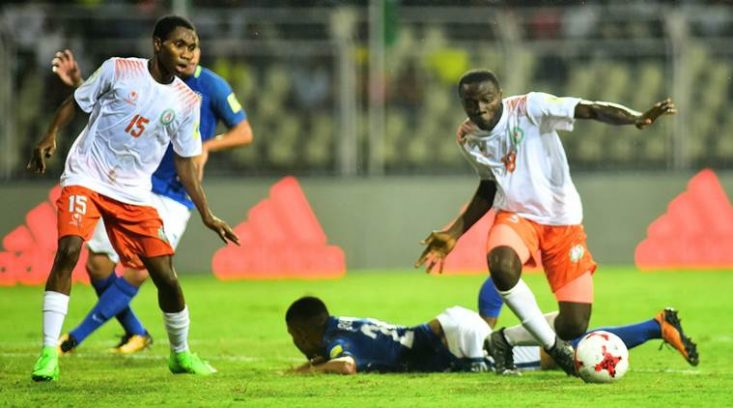
Express photo by Kevin DSouza, Goa 13-10-2017.
THE OPENING ceremony of the 2014 World Cup in Brazil was special for the people of Niger, in a slightly ironic way. Their team, of course, hadn’t qualified for the big event. But not according to whoever was responsible for projecting images of the flags of participating nations on the massive globe placed at the centre of the Corinthians Arena in Sao Paulo. For, when it was time for Nigeria’s flag to go up, it was Niger’s instead that appeared.
It was perhaps the first time anyone had ever mixed up one for the other in that order. And what a stage to do it, too. After all, for the people of Niger (Nee-zher in French and Nai-jer for the ignorant and in English) it’s always been the other way round.
“It is very irritating when you say I am from Niger and people say, ‘Ahh Nigeria, Nigeria’,” says Niger media manager Aboubakari Malik before adding with immense glee, “What happened at the World Cup was vice-versa. It was nice and I have even saved the picture on my phone.” He then proceeds to scan his phone for five minutes and finds it too.
Niger, incidentally, is not only bigger in size than Nigeria, it’s also the largest country in terms of land mass — 80 per cent of the country is desert — in West Africa. But somehow it’s a country that’s never quite managed to create its own unique identity outside the continent and has forever lived in the shadow or been mistaken for its similar-sounding neighbour with which it shares the Niger River. To the extent that it’s learnt even some of the FIFA officials at the Under-17 World Cup were blissfully unaware of the existence of Niger and were convinced that it was Nigeria who had made it to India.
“It’s like saying India and Taiwan are the same country,” says an annoyed Malik. “We do share some culture. Many of us look the same. A lot of people from southern Niger and northern Nigeria are of the Hausa tribe and even use the same currency. Nigeria is a former British colony and Niger is a former French colony. Their flag is green-white-green. Ours is orange, white and green like India, only that you have a blue sun, we have an orange sun,” he then explains.
When you tell him that people from both countries end up being referred to as Nigerians, he shoots back saying that happens only in English and gives you a quick language lesson. “In French, we are called different. We are ‘Nee-zherian’ they are ‘Nai-jerian’,” he says.
The two countries became independent only months apart in 1961 with Niger leading the way there. While subsequently Nigeria ended up growing into one of the most powerful economies in the world, arguably the strongest in Africa, Niger remained riddled with numerous military coups, poverty and an unrelenting population problem. Slavery wasn’t abolished in Niger shockingly till 2003 and it was only in 2010 that the country achieved some sort of stability and peace. Only last week, four American soldiers were killed in an ambush by alleged ISIS-affiliated fighters. But Malik jumps to his nation’s defence rather swiftly insisting that the situation back home is more peaceful now than it has ever been.
“I saw a proper machine gun only when I was 21. We had our last rebellion many years ago. Now it’s a peaceful country. There’s violence everywhere. You hear about Boko Haram and they’re from Nigeria,” he says.
He doesn’t take too lightly either when asked whether Nigeria’s almost big brother image over its neighbours will ever change. “I wouldn’t say we don’t have an identity. Nigeria has the most powerful economy in Africa. So it’s ok that people know more about Nigeria. But in certain sectors, we are more powerful than Nigeria,” says Malik. He then gets a little naughty. “Let’s take the best example. Nigeria aren’t here for the World Cup, are they? But we’re here,” he quips. And they haven’t only made it this far, they’ve also progressed into the knockout phase in this their debut appearance at the Under-17 World Cup.
Malik then talks about how the two countries used to be one before colonisation split them apart. But he reveals that they still remain very co-operative on many fronts, including having an organisation that settles all disputes and issues between them. The camaraderie also sees a lot of Nigerians traveling to Niger to learn French and also inter-country marriages. Though here Malik is very adamant that it’s Niger that holds sway, insisting that girls from his country are the prettiest in the region and therefore it’s Nigerian men who are keener to take the plunge across the border.
The kinship, surprisingly, even extends to the football field, according to Malik. While many Nigerians shift to Niger to further their footballing ambitions because simply as he puts it, “It’s far more difficult competing with over a 100 million than when they come to Niger.”
Malik counts former Nigerian legend Jay-Jay Okocha as his favourite player and says that Nee-zherians actually support Nigeria whenever they play in the World Cup or in other global competitions. Gernat Rohr, who is now the coach of the senior Nigerian team and has helped them qualify for the World Cup, was earlier with Niger for nearly two years.
That’s not all. When the two teams play, it is one of the very few rivalries in Africa where fans are not at each other’s throats and defeat is the end of the world. It’s actually a case of “let the best team win”.
“We often celebrate together,” he says before adding, “But of course we celebrated a little more a few months ago when the under-17 Niger team beat Nigeria to gain entry into the junior African Cup of Nations.”






